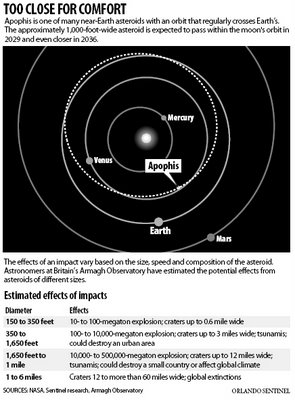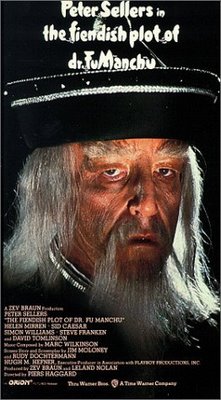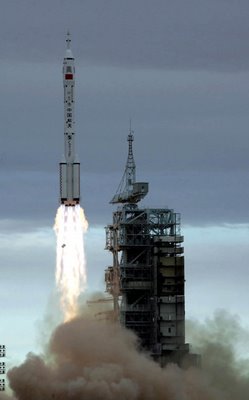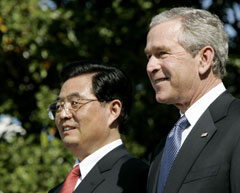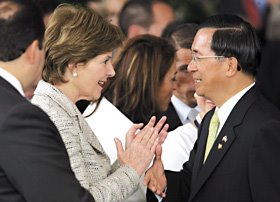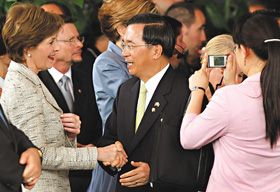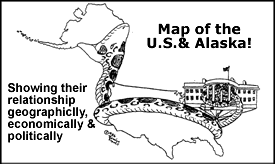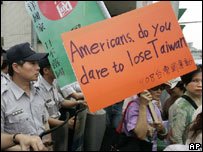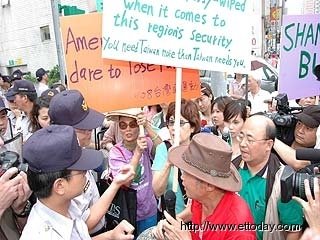Bevin Chu
May 28, 2006
In a previous article, "The Beginning of the End, Part VI: The DPP commits Political Suicide," I said that in order to save their political party, the DPP party hierarchy must demonstrate "the vision thing." They must jettison the corrupt, opportunistic Chen, who has run the party's image into the ground. They must forsake Chen's discredited Taiwan independence agenda, which has bankrupted the island's economy. They must embrace former DPP chairman Hsu Hsing-liang's "Da Dan Xi Jing" (Bold Advance Westward), the "West" in this case meaning the Chinese mainland. The DPP party hierarchy knows what it must do, not only to save their political party, but also to save Taiwan.
What has the DPP party hierarchy done?
Nothing.
The overwhelming majority of the DPP's party hierarchy has defaulted on the solemn responsibility of challenging Chen. Lacking the courage to "Speak Truth to Power," they have chosen their own short-term political survival over their party's long-term political fortune. In doing so, they have all but sealed the fate of both the DPP and the Taiwan independence movement. The DPP has committed political suicide.
That was in January 2006. It is now May 2006, and guess what?
Nothing has changed.
Despite the fact that the Taiwan Development Corporation scandal has finally, belatedly, led to the arrest of Chao Chien-ming, "president" Chen Shui-bian's son in law, on charges of insider trading, the DPP party hierarchy still refuses to face the ugly truth.

Chen Shui-bian's son in law, Chao Chien-ming
The ugly truth is that the purportedly "democratic and progressive" DPP has become more corrupt, autocratic and reactionary after a mere six years in power than the much maligned KMT after sixty.
The DPP party hierarchy has not only refused to face the ugly truth, it has formally declared "My president, right or wrong. My party, right or wrong. My ideology, right or wrong."
Don't believe me? Then read on.
DPP caucus promises to support Chen
Published on TaipeiTimes
Saturday, May 27, 2006
The Democratic Progressive Party (DPP) and its legislative caucus yesterday unanimously vowed to back President Chen Shui-bian and said they would work together to assist the president in stabilizing the political situation, in the wake of the president's son-in-law Chao Chien-ming's suspected involvement in an insider trading scandal.
As the DPP's reputation and image have been severely tarnished by the scandal, about 30 DPP lawmakers met yesterday to discuss how to heal the party's wounds and halt the emerging split between DPP factions.
After the two-hour meeting, faction leaders held a press conference at the Legislative Yuan to state that they would unite to rebuild people's trust in the DPP and they would try their best to assist the president to get through his current difficulties.
Translation: The DPP party hierarchy will try to sweep the dirt under the rug, put on a happy face, and go on with business as usual.
Taipei Times: Another caucus whip Chen Chin-jun urged DPP members not to be so eager to draw a line between themselves and the president.
"The only solution to the current predicament is to be more united than before. We don't think it is helpful to blame everything on the president," Chen Chin-jun said.
Translation: "You're all accomplices, your hands are as dirty as A-Bian's, so don't think you can get out of this by dropping the dime on A-Bian and singing like canaries."
Taipei Times: The DPP yesterday also issued a public letter signed by DPP Chairman Yu Shyi-kun, Vice President Annette Lu, Premier Su Tseng-chang, and former premier Frank Hsieh, urging all party members to remain calm and united and saying that the DPP will not let them down when eradicating corruption.
Comment: For passionate advocates of Chinese reunification such as myself, the fact that every one of the DPP's leading lights signed such a shameful statement is a positive phenomenon. It means that Taiwan independence leaders have decided that their own short term political advantage is more important to them than the survival of the DPP or the Taiwan independence movement.
The DPP party hierarchy has no chance whatsoever of salvaging the credibility of their one time political star Chen Shui-bian. Chen himself has seen to that. For the past six years, Chen has been busy emptying out the island's coffers, transferring Republic of China taxpayers' hard-earned wealth into the personal accounts of Taiwan's Quisling nomenklatura, including of course, the "First Family." That is one of many reasons Chen's approval rating has fallen to 5.8%, according to a poll conducted by DPP's Pan Green ally, the Taiwan Solidarity Union.

"President" Chen Shui-bian, feeling the heat
The DPP party hierarchy has little if any chance of salvaging the credibilty of the DPP as a political party, and of Taiwan independence as a political ideal. The DPP party hierarchy itself has seen to that. For the past six years, the DPP party hierarchy has been Chen's accomplice in wholesale Pan Green looting of the Republic of China treasury. Even those who did not actually pocket any booty themselves, are nevertheless guilty of aiding and abetting those who did. Even those who are legally innocent, are morally culpable.

Chao Chien-ming with mother in law and "First Lady" Wu Shu-cheng, the Lady MacBeth of Taiwan
The only chance, if any, that the DPP party hierarchy has of salvaging the DPP as an organized political force, and Taiwan independence as a persuasive political movement, is to draw a clear line between the party and the movement on the one hand, and Chen Shui-bian on the other.
Substantively speaking of course, this is impossible. From the viewpoint of justice, they deserve to go down with Chen Shui-bian.
From the viewpoint of public relations damage control however, they might be able to salvage what remains of their miserable political careers, but only if they get down on their knees and tearfully declare that "I once was lost but now am found, was blind, but now I see."
As we can seen, they have chosen not to. They have chosen not to for two reasons.
One, they are too greedy. Two, they are too cowardly.
Despite a handful of public prosecutors who have recently found the gumption to do what all one thousand of the ROC's public prosecutors should have done years ago, Chen Shui-bian still has a near total lock on the machinery of the central government. Therefore he can still dangle a carrot before the DPP party hierarchy's collective nose, and bring a stick down on the DPP party hierarchy's collective rear.
The DPP party hierarchy and the Taiwan independence nomenklatura have decided therefore that "The only solution to the current predicament is to be more united than before."
The DPP party hierarchy and the Taiwan independence nomenklatura will pay for their myopic decision. They will go down with Chen Shui-bian, as they deserve to, and justice will be served.


